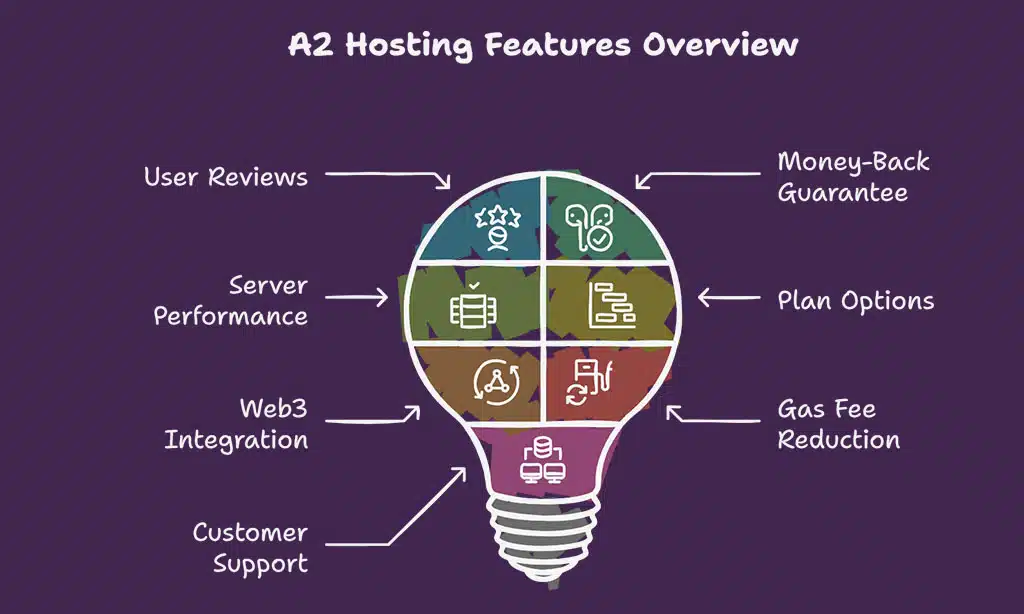You may hunt for a host that runs your decentralized applications fast and safe. Many providers charge high fees, slow down smart contracts, or lack cloud services and APIs. This gap can stall your decentralized finance idea or drive up gas fees.
A recent study shows Hostinger, HostArmada, and FastComet top user ratings at 4.6, 4.9, and 4.8 out of 5. We test seven Top Web3 Hosting Platforms on price, uptime, security, and support.
We also cover how they work with blockchain networks. Keep reading.
Key Takeaways
- Hostinger rates 4.6/5 from 2,449 reviews. You pay $4.99–$10.49 per month for 50–200 GB storage, 1–4 CPU cores, 4–16 GB RAM, a 30‑day money‑back guarantee, plus Docker and CI/CD support.
- HostArmada scores 4.9/5 from 952 reviews. Plans run $2.49–$35.73 a month for 15–80 GB space, two 2.2 GHz cores, 2–4 GB RAM, a 45‑day refund, Docker, Kubernetes, and hybrid‑cloud access.
- FastComet (4.8/5, 1,594 reviews) and A2 Hosting (4.7/5, 1,903 reviews) start at $1.79 and $2.99 per month. They offer 10–150 GB storage, 1–4 cores, 1–4 GB RAM, global CDN, NVMe drives, SSH, cPanel, edge caching, and blockchain RPC nodes.
- Chainstack and Ankr power custom Web3 clouds. Chainstack supports Ethereum, Solana, and BSC with auto‑scaling, ML tools, Kubernetes, and layered security. Ankr adds SSL, firewalls, peer‑to‑peer storage, container runtimes, GUI dashboards, 24/7 expert support, and governance tools.
- AWS Managed Blockchain rates 4.8/5 from 144 reviews. It hosts private and public chains, uses AWS Key Management Service and CloudWatch, maintains 99.99% uptime, spans regions, and scales from 1 to tens of nodes.
Hostinger: Economical and Scalable Web3 Hosting
Hostinger scores 4.6 stars from 2,449 users, and it backs every plan with a 30-day money-back guarantee. Its kernel virtual machine offers three tiers: 50 GB, 1‑core CPU, 4 GB RAM at $4.99; 100 GB, 2‑core CPU, 8 GB RAM at $5.99; and 200 GB, 4‑core CPU, 16 GB RAM at $10.49.
Teams spin up decentralized applications (dapps), launch smart contracts and manage blockchain integration on the same platform, with solid disk space and fast processors at a low entry cost.
The service scales like a growing tree, from a simple test site to a full decentralized finance (defi) network. It handles non-fungible tokens (nfts), crypto wallets and yield farming front ends with ease.
Developers run a command-line interface and use containerization to speed deployment. They lean on an orchestration platform or a CI/CD pipeline tool to manage gas fees, enforce security audits and protect data ownership.
HostArmada: Secure Hosting for Decentralized Applications
HostArmada shields your decentralized applications with solid servers and top tier security. It holds a 4.9 rating from 952 user reviews and offers a 45‑day money‑back guarantee.
Plans start with Start Dock: 15 GB space, 2 cores CPU, 2 GB RAM at $2.49 per month. The Web Shuttle plan gives 50 GB, a 2.2 GHz CPU, 2 GB RAM for $29.95. Web Voyager packs 80 GB, two 2.2 GHz cores and 4 GB RAM at $35.73 monthly.
Developers deploy dapps and smart contracts on Ubuntu or CentOS using Docker and Kubernetes. They run nodes that handle blockchain technology and digital assets in secure data centers.
Teams tap AWS EC2 or hybrid cloud setups through SSH. Tech staff manage consensus mechanisms and digital identities with minimal risk.
FastComet: Advanced Hosting Features for Web3 Developers
FastComet earns a 4.8 score from 1,594 reviews. It offers a 45‑day money‑back guarantee. The Starter plan gives 10 GB space at $1.79 per month. VPS Cloud 1 packs a 2.5 GHz CPU and 2 GB RAM.
It also adds 50 GB SSD for $46.16 monthly. VPS Cloud 2 raises CPU cores to 2 and RAM to 4 GB. That plan costs $53.86 each month.
Teams deploy smart contracts or host decentralized applications in a snap. They use SSH, Git and cPanel to manage code. FastComet links to a global CDN and an open source web server to speed up content delivery.
It fits blockchain technology, NFTs, decentralized finance, and DAO projects. Developers spin up Docker containers or Kubernetes clusters on the VPS. They can store digital assets in decentralized storage or run proof of stake nodes.
A2 Hosting: High Performance with Integrated Web3 Technology
A2 Hosting boasts a 4.7 rating from 1,903 user reviews and a 30‑day money‑back guarantee. It packs high‑performance servers and NVMe storage in every plan. Launch 1 offers 20 GB space, 1 core CPU, and 1 GB RAM at $2.99 per month.
Launch 2 and Launch 4 scale up to 75 GB or 150 GB space with 2 or 4 CPU cores and up to 4 GB RAM for $7.99 or $9.99 monthly.
Developers deploy decentralized applications and smart contracts on this stack. Servers tie into a smart‑contract blockchain network and public ledger network RPC nodes for cross‑chain work.
The service cuts gas fees with edge caching and block‑validation tools. Customer agents help with distributed file system and decentralized storage tasks.
Chainstack: Tailored Cloud Hosting for Blockchain Initiatives
Chainstack hosts blockchain projects on a custom cloud platform. It supports dapps and smart contracts, with node options for Ethereum, Solana, and Binance Smart Chain. Developers tap into machine learning services alongside blockchain technology for fresh ideas.
The service tackles Web3 hosting issues by offering ready tools and resources.
Enhanced security shields smart contracts and digital assets, blocking attacks. Auto scaling boosts performance during peak loads, cutting wait times on consensus mechanisms. Containers run under Kubernetes, easing deployment on cloud servers.
Networks tap into decentralized storage, oracles, and cross-chain transaction tools for smooth data flow.
Ankr: Infrastructure for Decentralized Web Hosting
Ankr builds infrastructure for the decentralized internet. It secures dapps, smart contracts, and blockchain technology with hardened firewalls, SSL encryption, and high-speed nodes.
Teams launch Web3 applications fast, using point-and-click dashboards and round‑the‑clock expert support.
Ankr links to a peer‑to‑peer storage network, runs workloads in a container runtime, and scales nodes on a cloud orchestration platform. Competitive pricing helps startups and digital asset projects manage costs, while governance tools tackle scaling and network rules.
AWS Managed Blockchain: Comprehensive Hosting for Web3 Enterprises
Teams host decentralized applications (dapps) on AWS Managed Blockchain to save time. The platform runs permissioned ledgers and public chains with cloud infrastructure. Users rate it 4.8 out of 5 in 144 reviews.
They praise uptime, secure smart contracts, and censorship resistance for defi and NFTs. Developers lock digital assets behind AWS Key Management Service and monitor logs with CloudWatch.
Enterprises leverage strict security compliance and stable performance around the clock. Amazon CloudWatch alerts keep engineers informed and fast. A multi-node design spans regions to handle spikes in transactions and gas fees.
Customer support staff answer tickets quickly to fix issues before apps break. The service scales from a few nodes to tens of nodes, to grow with business needs.
Essential Attributes of Top Web3 Hosting Platforms
A top host spins up Ethereum nodes, runs smart contracts on a proof of stake chain, and scales storage with a distributed file system, like a rubber band stretching on demand. Use Docker images and Kubernetes pods to test uptime, track transactions, and lock down your APIs with bulletproof security.
Scalability and High Performance
Scalability shapes dapp growth. Platforms must handle surges of traffic and data. Global Web3 market heads for a 43.7% CAGR from 2023 to 2030. Adoption of decentralized applications should soar by end of 2024.
Hostinger’s KVM 4 plan packs 200 GB storage, 4 CPU cores, 16 GB RAM at $10.49 per month. Blockchain nodes and smart contracts fire up without delays on such setups. Azure Kubernetes Service or Docker clusters spin new instances in seconds.
Distributed ledgers and consensus mechanisms stay stable under heavy load.
High performance drives user loyalty. Low latency boosts trading on decentralized exchanges and defi platforms. Systems log thousands of transactions per second. Binance Smart Chain or Ethereum mainnet link to low‑gas nodes hosted on AWS Managed Blockchain.
Developers grab data from decentralized storage in milliseconds. Throughput climbs as CPU threads multiply. Memory buffers avoid gas fee spikes under load. Users enjoy smooth interfaces on NFT marketplaces.
Robust Security Features
Each server encrypts user data. The system splits files across IPFS nodes. Attackers face layers of defense. Crypto wallets hold private keys. Multi-signature rules guard smart contracts.
The platform meets blockchain security standards.
Hosts monitor traffic with real-time alerts. Systems block DDoS attacks in seconds. Uptime hits 99.99% per month. Developers test consensus mechanisms on testnets. Teams run audits on Ethereum and Binance Smart Chain.
Decentralized apps gain strong protection.
Blockchain-Compatible Support
Hostinger and A2 Hosting link to Ethereum, Solana, and Binance Smart Chain. They run full nodes to support smart contracts and mint non-fungible tokens (NFTs). Sites plug into crypto wallets and decentralized oracles.
Those bridges cut gas fees and ease cross-chain transactions.
Developers test decentralized applications (dapps) on proof of stake or proof of work networks. They sync data with the graph and host files on decentralized storage. Platforms offer APIs for flash loans, yield farming, and defi dashboards.
This setup guards blockchain security and speeds user adoption.
Choosing the Right Web3 Hosting Platform
Check speed, cost, security, API tools, smart contract support, crypto wallet links, and decentralized storage, then keep reading to see our top picks.
Cost Efficiency and Flexibility
Hostinger charges $4.99 per month for a plan. It lets startups spin up virtual private servers fast. You can add RAM or storage on demand. This model fits blockchain technology projects and small dapps.
You only pay for what you use.
A2 Hosting starts at $2.99 each month. Teams can run containerized applications with container technology. They scale up servers to host smart contracts. The system links to application programming interfaces and crypto wallets for decentralized applications.
This setup saves money and cuts resource waste.
Accessible Developer Tools and APIs
Developers tap APIs like Web3.js, Ethers.js, or Infura to link apps to blockchain technology. They send smart contracts or read dapps data with a few lines of code, as easy as flipping a switch.
Kamatera plans start at $4.00 per month and ship node access along with those APIs. That combo trims gas fees and speeds up blockchain integration for any decentralized app.
Command-line kits and SDKs act as toolboxes for web3 infrastructure. You can deploy a dapp or pin files on decentralized storage in minutes. Hardhat, Truffle, and MetaMask plug right into cloud hosts, too.
They iron out setup bumps so coders write more code and spend less time on servers.
Reliable Customer Support and Resources
Platforms answer support tickets in under one hour. They score 4.9 in customer support. The average rating hits 4.8. Teams update FAQ pages, video tutorials, and API docs daily. They host Azure DevOps pipelines and The Graph guides.
Readers grab code snippets, CSS tips, and blockchain integration tricks.
Forums stay live around the clock. Users share tips on cross-chain transactions, gas fees, and decentralized storage. A newbie fixed a smart contract bug in thirty minutes with peer advice.
Experts pitch DeFi tactics and NFT mint hacks. Community guides support DApps, DAOs, and digital assets.
Takeaways
Choose a host that fits your dapps and NFT marketplace dreams. Hostinger, FastComet and Ankr deliver top speed for smart contracts and cross-chain swaps. You will see seamless integration with MetaMask and The Graph queries.
Each provider handles gas fees and maintains blockchain security at scale. This guide helps you pick the right partner for your decentralized exchange or storage project.
FAQs
1. What makes these web3 platforms top picks for 2025?
They host websites on blockchains, tap the graph for fast info, tie into the decentralized internet. They guard your data, add censorship resistance, and give true data ownership. They greet you with low gas fees and swift page loads.
2. Can these hosts run dapps and smart contracts?
Yes. You deploy dapps and smart contracts with ease. You call decentralized oracles via node networks for live data. You link into defi, yield farming, cross‑chain transactions, decentralized exchanges, all secure with crypto wallets.
3. How do they solve high gas fees and scalability issues?
They beat gas fees by using layered chains and an automated market maker. They cut costs with proof of stake, split tasks among node networks. They fix scalability issues so your site runs like a well‑oiled machine.
4. How safe are my data and digital assets?
Your files sit in decentralized storage, not in one database. Blockchain security locks them tight. You keep full data ownership. No single server or cookie can track you there.
5. Can I link to nft marketplaces and virtual real estate?
Absolutely. They link to nft marketplaces, let you mint non‑fungible tokens, trade virtual real estate. You swap NFTs like cards at a block party. They power the metaverse and let digital assets flow free.
6. How do I manage user access and privacy?
They drop old client‑server models, serve bare metal or node networks. They power identity management, guard cookies, block trackers. You chat in decentralized autonomous organizations, post on social media, all in a social web without middlemen. You can browse in the brave browser, ad‑light and secure.




































